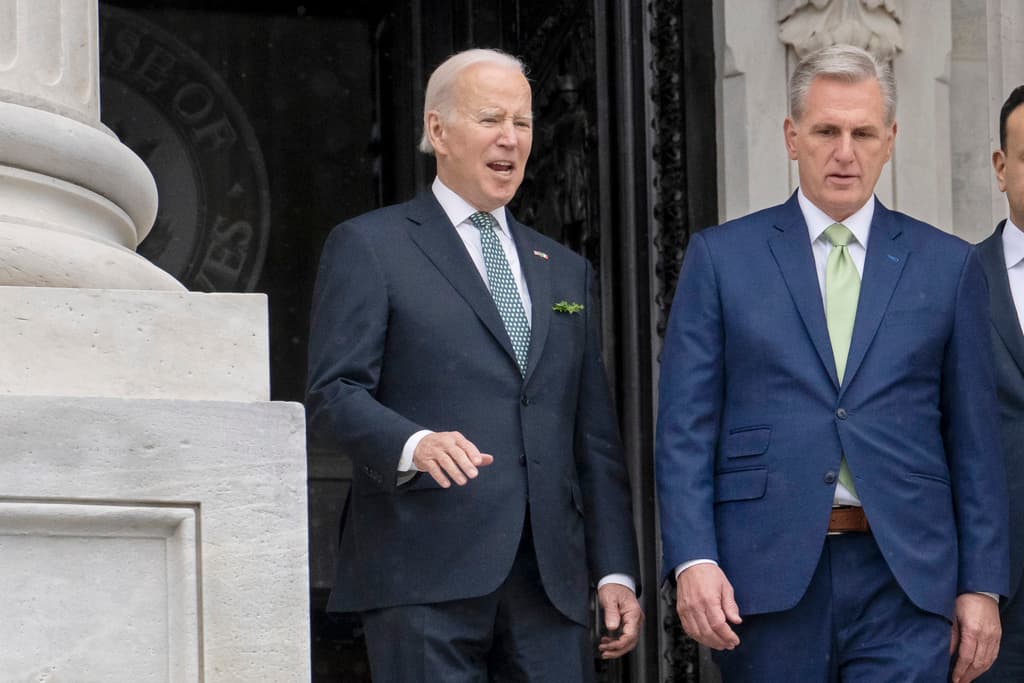McCarthy’s Push Toward Impeachment Meets With Skepticism From Moderates and Budget Hawks in His Caucus, and Outright Resistance From GOP Senators
Polling shows voters are more interested in the economy and that many view impeachment as a political stunt.

Speaker McCarthy’s push toward an impeachment inquiry into President Biden as “a natural step forward” is meeting with resistance from some of the House Republican conference’s more conservative members, as well as from budget hawks who argue that an inquiry could distract from the kitchen table issues they say are of greater interest to voters. Some Republican senators are also pushing back with similar arguments.
Congressman Mike Lawler of New York has expressed concern that an impeachment inquiry might be premature. Mr. Lawler, who is in a district Mr. Biden won by 10 points last cycle, told Fox News Monday that “we’re not there yet” when asked how he would vote on an impeachment inquiry.
Congressman Ken Buck, a member of the conservative House Freedom Caucus and a sharp critic of government spending, has said that, though he supports the ongoing investigations by House Republicans, he thinks talk of impeachment is distracting from more pressing issues of excessive spending.
“This is impeachment theater,” Mr. Buck told the Hill. “I don’t think it’s responsible for us to talk about impeachment. When you start raising the ‘I word,’ it starts sending a message to the public, and it sets expectations.”
In the Senate, some Republican members have expressed concern that the House GOP lacks the evidence needed to impeach, with Senator Capito telling Axios that she doesn’t think they have enough evidence of wrongdoing by the president.
“We’ve got so many things we need to be focusing on,” Ms. Capito said. “I don’t see the glaring evidence that says we need to move forward. I didn’t see it in the Trump case, and voted against it. I don’t see it in this case.”
Others, like Senators Romney and Tillis, perennial critics of President Trump, have expressed concerns that investigations haven’t so far produced evidence of high crimes or misdemeanors from the president, and that pursuing an impeachment under such circumstances could cheapen the seriousness of such a maneuver.
Senator Tuberville also appeared averse to impeachment in a conversation with Axios, saying that he’s “not for going through another damn trial to be honest with you. [We] did that here with Trump.”
While some Republicans, like Senators Hawley and Vance, have by contrast expressed strong support for an impeachment inquiry, Democrats in the Senate are openly mocking the Republicans pushing for an inquiry.
Senator Fetterman on Wednesday told reporters that “sometimes you just gotta call their bulls—” when asked about a potential impeachment inquiry. “Your man has what, three or four indictments now?” Mr. Fetterman said. “Trump has a mugshot, and he’s been impeached twice.”
Recent polling suggests that the House’s impeachment drive may be out of step with the attitudes of voters in the general electorate.
According to a Public Policy Polling survey, most Americans, 56 percent, say they think a Republican impeachment inquiry into Mr. Biden would be “more of a partisan political stunt” than a “serious effort to investigate important problems.”
Thirty-eight percent of respondents said that they think the impeachment inquiry would be more of an investigation into an important issue.
Broken down by the candidates respondents voted for in 2020, 88 percent of voters who supported Mr. Biden and 20 percent of voters who supported Mr. Trump see a potential impeachment inquiry as a political stunt.
For comparison, 73 percent of voters who supported Mr. Trump and 7 percent of voters who supported Mr. Biden see the potential inquiry as being concerned with an important issue.
A new survey from the Economist and YouGov has also asked Americans about their political priorities heading into the 2024 presidential election, and economic issues were top of mind for the vast majority of voters.
Inflation and prices were the top concern for 23 percent, followed by health care at 12 percent, jobs and the economy at 12 percent, and climate change and the environment at 10 percent. No other issue was the top priority for more than 10 percent of respondents.

